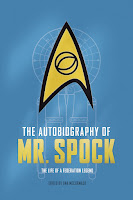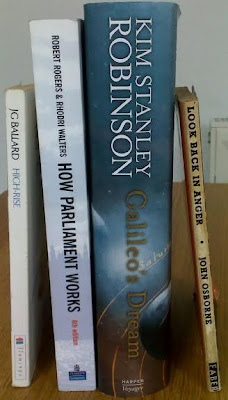The Making of Doctor Who by Malcolm Hulke and Terrance Dicks — their names in that order — was published in paperback by Piccolo on 20 April 1972. It was the first book with Terrance’s name on the cover, but I decided not to begin this series of posts on his 236 books with it because it’s not really his “first book”.
Terrance certainly didn’t think so:
“The Auton Invasion [published in January 1974] was the first book of any kind I’d written, and I worked very hard on it.” TD interviewed by Peter Griffiths, “Author! Author!”, Doctor Who Magazine #273, cover date 12 January 1999, p. 46.
In April 1976, Terrance mentioned in a letter to Harvey Unna — the agent he shared with Hulke — that royalties on The Making of Doctor Who had always been split 3:1 in Hulke’s favour. But that doesn’t mean Terrance did 25% of the writing. So what did he do on this book?
Hulke mentioned in a letter while working on The Making of Doctor Who in September 1971, that Terrance was due to interview the show’s original producer, Verity Lambert, about the early days of the series. Hulke, meanwhile, interviewed Donald Wilson and corresponded with Sydney Newman and David Whitaker. (The correspondence with Newman survives, and includes a transcript of the interview with Wilson.)
That suggests that the bulk but not all of the material here on the origins of Doctor Who was researched and compiled by Hulke. In the process, Newman’s account of first conceiving the Doctor as, “a senile old man 745 years old from an un-named planet” (Newman to Hulke, 28 September 1971) was changed to the kinder, more heroic, “Let’s make him a crotchety old man … at least 745 years old” (p. 3). We don’t know if it was Hulke or Terrance who made the substitution, but Terrance used “crotchety” again in both The Doctor Who Monster Book (1975) and the revised version of The Making of Doctor Who (1976).
I suspect that Terrance also conducted the interviews with then-current cast members Jon Pertwee, Katy Manning, Roger Delgado, Nicholas Courtney, Richard Franklin and John Levene, as well as with former Doctors Who William Hartnell and Patrick Troughton, and with Jack Kine of BBC Visual Effects. Their contact details would have been kept on file by the Doctor Who production office, where Terrance worked as script editor, so it would have been relatively quick and easy for him to ring round — perhaps a morning’s work.
(Hulke interviewed Donald Wilson and made contact with Newman in September 1971, so Terrance probably rang Hartnell and Troughton around this time, too. One of them, surely, mooted the idea that perhaps the actors might like to reappear in the series. Then, at the end of February 1972, writers Bob Baker and Dave Martin attended studio recording of their Doctor Who story The Mutants and Terrance must have raised with them the prospect of a new adventure involving all three Doctors. On 3 March, they duly sent Terrance an outline for Deathworld, eventually made as The Three Doctors.)
As well as conducting a share of the interviews, Terrance facilitated some of Hulke’s research, such as loaning him the production office’s scripts of all previous Doctor Who stories — Terrance wrote to ask for them back on 23 November 1971, in a letter included among the PDFs on the Season 9 box-set (10-03 — Frontier in Space production documentation, p. 2). Hulke’s sometime partner Lauraine Palmeri worked through these scripts, making summaries of plots from which Hulke then wrote his in-universe narrative of all of Doctor Who so far, as recounted by the Time Lords and by Brigadier Lethbridge-Stewart in the 24-page chapter “The Travels of Doctor Who”.
This is by far the biggest chapter in the book, accounting for just over 20% of the 115 pages. Add to that the in-universe chapters on everything we’ve learned about the Doctor (13pp), an account of his trial (4pp) and a doctor’s report on his physiology (3pp), and just over 38% of this non-fiction guide to the making of Doctor Who is, er, fiction.
What’s more, this stuff is riddled with small errors. The first chapter quotes a line of dialogue written by David Whitaker that was never used in a broadcast episode (p. 8). The book claims that the Cybermen originate from Telos and “first appeared on television on February 11th, 1967 in a Doctor Who story set on the moon” (p. 14), entirely ignoring the existence of and events depicted in The Tenth Planet (1986). The “Travels of the TARDIS” section correctly says Cybermen feature in The Tenth Planet, but adds that events take place in the year 2000, not 1986 (p. 49).
On 30 May 1972, fan Richard Landen wrote to Hulke and Dicks listing such errors over two pages, in the hope they could be corrected in the next edition. Terrance kept a copy of this letter and, indeed, corrections were made to the manuscript of the 1976 version. This is the first example I’ve found of fans advising Terrance on Doctor Who history and lore.
Hulke was on steadier ground writing the 19-page chapter “Diary of a Production”, since its about the making of his own story, The Sea Devils, which was in production at the time he wrote this book. He provides information not found in other sources — exactly what he was briefed to write by Terrance and producer Barry Letts, the changes made at different stages of commissioning, details of elements that were lost such as the Doctor waterskiing. He also shares passages from otherwise now-lost original storyline and scene breakdown for the story.
It’s a shame there isn’t more of this — longer excerpts from paperwork, more detail on exactly what happened and when, with dates. There’s an interview with Jack Kine about making monsters (4pp), but it might have been nice to hear, directly, from director Michael E Briant and other members of the cast and crew about what was involved day-to-day, in the thick of production.
Instead, we get a chapter exploring some real science and philosophy suggested by Doctor Who, entitled “Could It All Be True?” (9pp), in which Hulke — an atheist — cites the books of Joshua and Ezekiel. This is followed by what’s basically a sermon, contributed by the Rev John D Beckwith AKC, Chaplain to the Bishop of Edmonton. This has caused me a bit of a headache.
The see of Edmonton was new, having been created in 1970, with Alan Rogers appointed as first bishop. Prior to his appointment as chaplain, the Rev Beckwith, born c. 1933, had been senior tutor of Ijebu-Igbo Great School and Molusi College in Nigeria (1960-62), assistant curate of Bedale (1962-63), Mottingham (1965-69), house tutor at Eltham College (1964-69), and chaplain of St Andrew’s Gothenburg, with Halmstad and Jönköping, Sweden (1969-70) — source.
He had worked in schools, so had some qualification for contributing to a book aimed at children. But he doesn’t seem to have made a habit of this sort of thing, such as writing for other publications or appearing in the media. Sadly, the current Bishop of Edmonton doesn’t hold records going back to 1971 (I did ask!), so I’m a bit stumped as to how Hulke might have known the Rev Beckwith. Do please write in if you know.
(I’d also be grateful for any information about Charles Bowman and Catherine Dale, who are named at the top of the page of Thanks.)
While I don’t know the connected between Hulke and Beckwith, I can guess why Hulke might have wanted a closing word from such a figure. In early 1971, Doctor Who had been widely criticised for being too scary and unsuitable for children. Then, as Barry Letts detailed in his memoir, his boss Ronnie Marsh, Head of Serials at the BBC, objected to the “blasphemous” use of a church in The Daemons, requiring last-minute rewrites to a story already in production. I think Hulke effectively tried to head off this kind of criticism by obtaining the church’s blessing for Doctor Who.
I also think he was keen to show the scientific and social value of the series because The Making of Doctor Who had originally been conceived by science-fiction writer George Hay in light of the success of two books published in the US: The Making of Star Trek by Stephen E Whitfield and Gene Roddenberry (1968), and The Making of Kubrick’s 2001 by Jerome Agel (1970). These were both aimed at adults. Subsequent editions of the Star Trek book sought to reach more widely than fans of science-fiction by claiming to be,
“The book on how to write for TV! … The only book of its kind! The complete history of a top TV series — how a television show is conceived, written, sold and produced.”
The book on 2001 also took a broad view, digging into the ideas in and related to the film — at once making-of and quest for meaning. Jerome Agel had form in this, having previously worked with Marshall McLuhan on both The Medium is the Message and War and Peace in the Global Village, as well as cowriting I Seem to Be a Verb with Buckminster Fuller.
Hulke, I think, fancied some of this chin-stroking stuff. His final, short chapter, “The Shape of Things to Come”, shares some hints about that might be coming up in future stories, hinting that the Doctor might recover the use of his TARDIS. But the title of the chapter is from HG Wells, a 1933 novel — then a film — that laid out a future history spanning hundreds of years, in some ways a kind of fictional sequel to his non-fiction A Short History of the World.
There’s something of this long view of history in Hulke’s approach to “The Travels of Doctor Who”, which is largely related by the Time Lords — who are very like the super-elites favoured by Wells.
George Hay was, like Wells, interested in the idea of using fiction as a kind of blueprint for the future. I recently wrote about the book he edited, The Disappearing Future (1970).
So all of this stuff went into the mix, and I think helps explain the structure. But the result is not very much about the actual making-of Doctor Who. The cover, showing a photo of Jon Pertwee and a Sea Devil, is from a TV story that had only finished being shown on TV on 1 April 1972; the book was published just over two weeks later. It promises Doctor Who of the immediate now but that isn’t what this book is.
It also isn’t exactly a how-to guide for wannabe writers or crew. There’s no tacit encouragement to readers to try and get into the industry, no tips for young readers who might write their own adventures. That’s notable given Hulke ran a course for writers, had edited two editions of the Writers’ Guide for the Writers’ Guild of Great Britain and would go on to write the hugely influential guide Writing for Television in the Seventies.
But I’ve spoken to a whole load of people who now work in TV and publishing for whom this book lit a spark. For them, it was a blueprint for the future. Job done.
And then Terrance rewrote it, without Hulke, for Target. We’ll get into that in Part II — but maybe not for a few days as I’m off doing things this weekend.




















